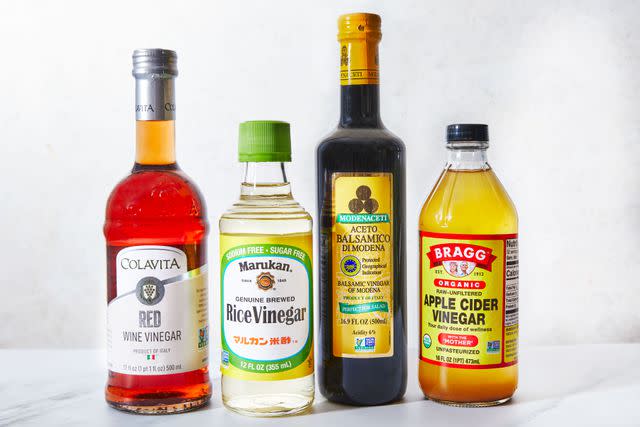Does Vinegar Go Bad?
And how can you know when vinegar is bad?
Vinegar is a pantry staple, and there’s a good chance you have multiple varieties on hand for use in various recipes. So many recipes call for white distilled, apple cider, balsamic, red wine, or rice vinegars. But if most of your dishes only need a splash or two, you may find yourself staring at a half-used bottle purchased further back than you can remember and wondering, "Does vinegar go bad?"

Caitlin Bensel; Food Stylist: Torie Cox
Does Vinegar Go Bad?
Because vinegar is an acid, it has an "almost indefinite" shelf life, according to The Vinegar Institute. And that's great news for your budget, reducing food waste, and being able to keep multiple varieties of vinegars on hand that you don’t use too often.
"Vinegar is like wine—it’s there to be a workhorse or a sauce base,” says Chef John Shields of Smyth + the Loyalist, known as an expert in pickling and fermentation and a 2023 James Beard nominee.
However, the long shelf life doesn’t mean that bacteria can’t grow in your vinegar. Once opened and exposed to air, harmless vinegar bacteria may indeed start to grow. The telltale sign? A formation of cloudy sediment, that you can simply strain off before using and never give a second thought to.
Does Vinegar Expire?
All vinegar bottles will have a "best by" date printed on them, but don't get too hung up on it—since vinegar doesn't technically expire, these dates are simply a clue of when to expect peak freshness. For most situations, you can keep a bottle of vinegar on hand for two to three years without cause for concern.

Caitlin Bensel; Food Stylist: Torie Cox
Does Apple Cider Vinegar Go Bad?
Apple cider vinegar is an excellent choice for vinaigrettes and pickling. Go ahead and fish it out of the back of your pantry the next time the mood strikes, because it’s still good thanks to its self-preserving acidic and antimicrobial properties.
Does Balsamic Vinegar Go Bad?
Balsamic vinegar is perfect for dressings, glazes, dips, marinades, and reductions—heck, even drizzled on top of vanilla ice cream (go ahead, give it a whirl!). The best part? This vinegar typically gets better with age, so there’s no need to worry about an expiration date dampening your culinary plans.
Does Red Wine Vinegar Go Bad?
Just like its cousins, this classic addition to salad dressings, sauces, marinades, and reductions also has a nearly indefinite shelf life. Feel free to keep your red wine vinegar until you’ve used up every last drop.
Does Rice Vinegar Go Bad?
A favorite for sauces, marinades, dressing and stir-fries, rice vinegar stands the test of time just as well as other varieties. If you notice a change in quality or flavor, toss it and grab a new bottle.
How To Know When Vinegar Is Bad
According to The Vinegar Institute, white distilled vinegar will remain virtually unchanged over an extended time. And, while other types of vinegar may experience changes in color or the development of a haze or sediment, these are only aesthetic changes that won’t negatively impact usage.
"Common sense plays a key role when it comes to fermentation," says Shields. "Your body, nose, and senses will tell you something isn’t right. If it smells off, it’s off; but that doesn’t mean it can’t be used for something else."
What Happens if You Use Old Vinegar?
Nothing bad will happen if you ingest vinegar past its "best by" date, but if you notice a funny taste, smell, or look, consider it time to explore other uses (and add a fresh bottle to your grocery list).
This is when creating DIY cleaning solutions can come in handy, as vinegar is known to be an effective household cleaner.
That means you can still use white vinegar for cleaning even if you no longer think it’s safe to use in recipes. For instance, according to The Vinegar Institute, you can use apple cider vinegar to clean gold jewelry, or white distilled vinegar to clean kitchen appliances, kill weeds, and remove wine stains.
The Proper Way To Store Vinegar
Vinegar is a self-preserving product due to its acidic nature, so it does not need to be refrigerated. Simply store your various kinds of vinegar in a dark pantry with a well-sealed lid, as keeping air and light out are an important part of preservation.
For more Southern Living news, make sure to sign up for our newsletter!
Read the original article on Southern Living.

